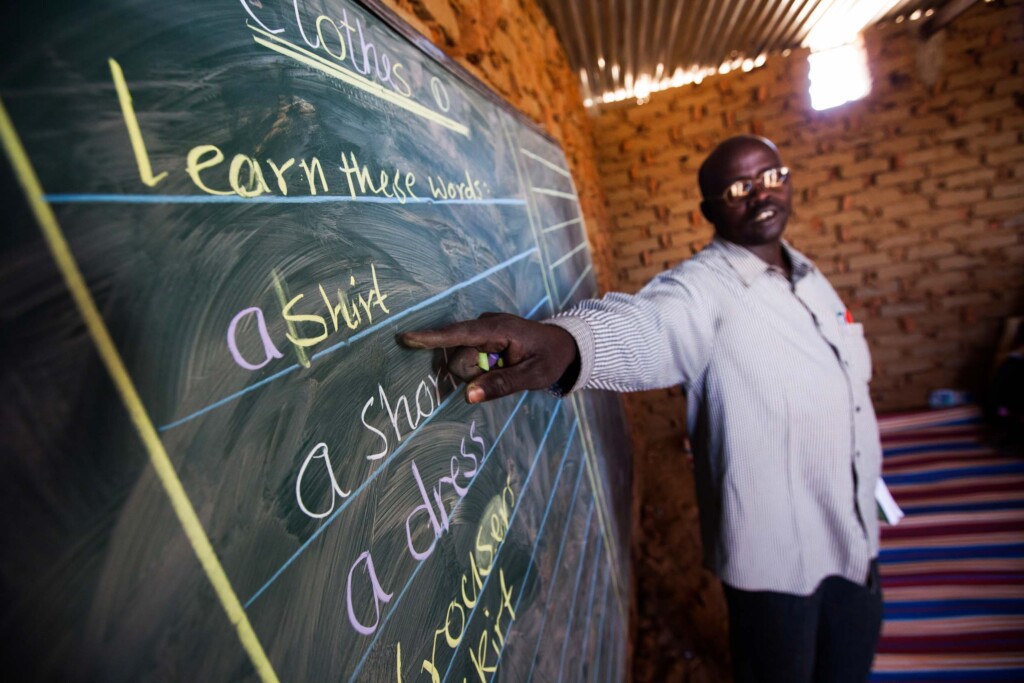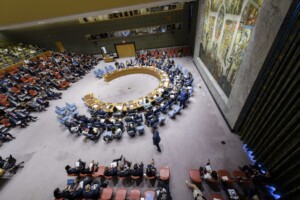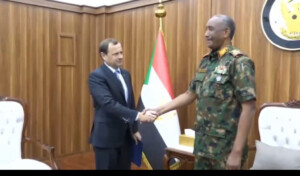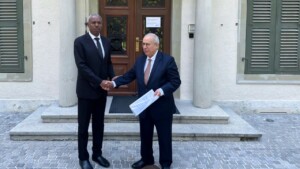Teachers to maintain strike in Sudan ‘until all demands are met’

A teacher in Darfur, Sudan (File photo: Albert González Farran / UNAMID)
Sudanese teachers have embarked on another three-week stretch of nationwide comprehensive strike action after what they termed a disappointing meeting with the Minister of Finance last week, who not only refused to meet their demands, but also abandoned previous promises.
The Sudanese Teachers Committee (STC) reported yesterday that more than 16,000 schools in Sudan are participating in the strike, which also took place throughout much of December with previous industrial action in November as well.
Sami El Bagir, spokesperson for the Sudanese Teachers Committee (STC), said in a press conference in Khartoum yesterday that the strike will continue until all their demands are met.
‘The strike will continue until all our demands are met’ – Sami El Bagir
The strike had been set to last at least until January 28.
El Bagir told Radio Dabanga that the reports received from the states confirm the implementation of the strike action, with the closure of schools, in more than 90 per cent of schools in the country.
The comprehensive school closure was implemented on Sunday in 10 states whilst three other states witnessed partial closures on the first day of the strike.
Earlier, the STC had already explained that teachers in the Blue Nile region and South Kordofan are not participating in the strike is due to the special circumstances in the two regions, she said.
“We are in continuous contact about the strike with teachers in these areas.” Both regions witnessed significant violence and insecurity recently.
Classes continue in the many private schools in the country, in particular in the capital.
“The economic conditions are very difficult. The monthly salary of a teacher who has spent 30 years in service is equivalent to $120, so after we reached a dead end at the Finance Ministry on Thursday, we decided to close the schools in order to obtain our rights.”
Disappointing govt response
The teachers hold the government “fully responsible for the consequences of the teachers’ strike,” he said.
“Our meeting with the Minister of Finance [in Khartoum on Thursday] was disappointing, which necessitated us to declare a comprehensive strike for three weeks,” he explained.
Finance Minister Jibril Ibrahim informed them that there would be no space for an increase in minimum wage in the 2023 budget, “which means that the teachers will have to cope with a worse situation this year”.
The Finance Ministry also abandoned its previous agreement related to new allowances for teachers, amounting to 50 per cent of their basic salary and reneged its previous commitment to pay discrepancies in their dues for three months.
After earlier strikes in November, the Service Affairs Bureau promised 6 per cent increase in wages, but teachers lament that this barely covered the rise in the cost of living in Sudan and ignores high inflation rates.
On November 28, the Teachers’ Strike Committee also organised a nationwide comprehensive strike because they had not received their full financial dues, such as back payments that were owed to them as far back as 2020.
The meeting with the Minister of Finance “has reached a dead end,” El Bagir said. The Minister told them during the meeting: “You will not find solutions with me. There will be no increases, so you better go to the Sovereignty Council,” El bagir explained.
‘You will not find solutions with me. There will be no increases…’ – Jibril Ibrahim
He further denied that the teachers’ strike is linked to politics and said he hopes that the families and parents of the students will understand the reasons for the strike, “even if it leads to changes in the school calendar”.
Problematic decisions
STC member for the states, Mohamed Hamed, further lamented the fact that a decision according to which the salaries for teachers were increased for two months was implemented in central Sudan (Khartoum area), but not in the rest of the states.
“This practice is part of the policy of divide and rule,” he said.
Duriya Babiker, member of the STC Executive Office, meanwhile lamented the implementation of standardised exams.
“By imposing standardised exams, the teachers will not be able to evaluate their students correctly anymore,” she said at the press conference. “Its sole purpose is to collect more exam fees, which only increases the burden on the students’ families.”
Threats and repression
A number of schools in Khartoum received “violent threats”, El Bagir said and accused “a high executive authority of being behind these threats”.
In White Nile state, education departments in various administrative units threatened teachers with transfer, dismissal, and suspension of their salaries in an attempt to break the strike.
Howeida El Ameen, spokesperson for the White Nile state Teachers Committee, told Radio Dabanga that teacher Hamad El Tom was dismissed in Shabsa in El Duweim, where policemen also chased students on the streets after they refused to sit for exams.
She said that the strike participation rate in secondary schools is particularly high. “About 85 percent” of staff is participating in the strike in the state.
To pre-empt the strike, the authorities in North Darfur, Northern State, and Red Sea state, suspended classes while the authorities in Sennar instructed trial exams to take place this month.
In many places, authorities are hoping to exhaust the striking teachers by not giving in to their demands and suspending classes ahead of the strike action, El Bagir explained.
“The authorities are betting on prolonging the period of closing schools in order for the teachers to lose their resolve and resort to continuing their work.”









 and then
and then